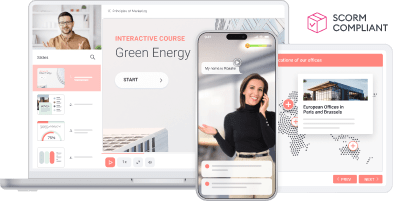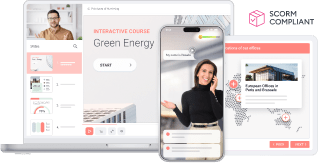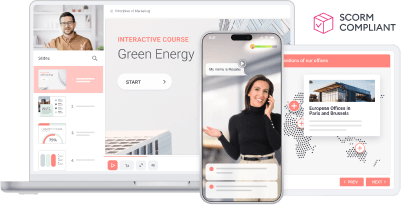27 Instructional Designer Interview Questions and How to Answer Them

АIt’s an exciting time to be an instructional designer! There are so many opportunities to help organizations, schools, and entire industries build better learning, especially digital learning or learning experiences. And there have never been more interesting technologies, templates, and media to use in instructional design plans and development. If you’re looking for your next great role, getting a solid understanding of the types of instructional designer interview questions you will be asked is a must in acing your interview and landing that next job.
There are some things you’ll need to prepare in order to get the opportunity to land an instructional design role. Here, we’ll cover the entire process, but will focus on example questions and answers that instructional designers experience during the interview.
Preparing for the Interview
Of course, every interview requires preparation, just as you had prepared your resume by tailoring it to fit the job posting advertisement. To prepare for the interview, you should know the organization you will be interviewing for, the people you’ll meet in the interview, and the people you will be working with in your new (hopefully!) role. It’s a really good start to check out sites like LinkedIn and professional groups (ATD, Learning Guild, and others) to understand more about the organization and the people you might interact with. It’s vital that you do as much as you can to stand out against other candidates.
Additionally, you should prepare a portfolio of work examples to demonstrate your capabilities as an instructional designer. Be clear within your own work history about what demonstrates the role you played and what your team members did in the projects you select to showcase your talents. If your work is protected by an NDA, consider taking a screenshot that is indicative of the project and writing a synopsis of what it was, how you did it, how long it took, and who was involved. Be ready to show your work in the interview, even if it’s just screenshots and discussion.
Next, anticipate some questions you may encounter. Questions usually get presented by the hiring manager (the learning manager who likely knows about learning and instructional design), but depending on the organization, questions may also be presented by the HR business partner or creative director. You should be aware of the needs of each and think about their underlying assumptions and reasons for asking you questions.
Below you will find our example questions and answers categorized by who might present them to you in the interview.
Also read: 17 Key Recruiting Metrics and How to Improve Them with Online Training
HR Business Questions
Usually, the HR talent advisor in the room will be looking for an overall good fit to the culture of the organization or the team to which you will be reporting. They will also be looking for your ability to respond in a positive and constructive manner, the completeness of your questions, and the way in which you interact with the others in the room. They are not specialists in your area, so their job is to ascertain if you will fit in with the work group and they are likely to ask more behavioral questions. Here are some questions a HR representative might ask.
1. Tell me what you know about the organization and the role
This is to understand if you prepared for the interview and how difficult it will be to orient you to the organization, if you already know people or have done work, or interacted, with the organization, and whether you can understand the role being presented or not.
How do you answer?
Be honest. If you have done your homework, then you’ve been to their site and explored their key business proposition and customer base. If you have worked with, or interacted with, people in the company before, say so, but make sure you are upbeat in your language. Even if your interaction wasn’t so positive, you don’t know that person’s relationship to the people in the room, so keep it light and don’t lie or speak in vagaries.
2. Tell us briefly about your career and the reason you wish to join our company
Human Resources is looking for red flags in your resume history and are any gaps between what you say on paper and how you represent it in person. They are also looking at your body language when talking about your roles, your contribution, and your reasons for wanting to join.
How do you answer?
Be concise, enthusiastic, and genuine. You can cover experiences in a sentence or two. If the role or a particular project would be of interest in the position you are interviewing for, explain that a bit more. Don’t talk about parts of the projects that you worked on if you didn’t do the work yourself. It’s important to be very clear to the hiring manager about what you did for a customer or on a project, so they are clear about your capabilities. Being untruthful or stretching your experience will be noticed at some point, so be your genuine self!
If you are leaving the company you work for now because they are not suited to you, then be brief and simple, but honest. You can say something like, “I am looking forward to growing my skills in [X]”, or “there may be a better use for my skills here because I am excited to [what do you think you can contribute]”.
3. You have experience in this business/industry but less experience in the instructional design role. Tell us how you made the transition?
The talent advisor asking this question has to make sure that the actual instructional designer role can be performed effectively and completely, so experience counts both with reference to knowing the business and knowing the job.
How do you answer?
If you are moving from a facilitation, coordination, or teaching role, you have experience with classrooms or other educational settings, so focus on that. If you are coming to ID from the role of subject matter expert, human resources, project management, graphic design or other related professions, make sure you’re comfortable with the principles and the ‘science’ of adult education and instructional design.
If you need to refresh your memory, check out this article on instructional design. If more than 40% of this article is new to you, it would be a good idea to learn more about instructional design before you apply for ID jobs.
Learning and Design Manager Questions
The learning and design manager is going to ask you some pretty specific questions about the role of an ID or an eLearning developer and your experience with the various tasks asked of one. From the job posting, you should be able to determine whether this is a consultative, design, development, technical, or coordination role. Be sure to be truthful about your experiences, but don’t discount your abilities with elements that may not be specifically related to instructional design tasks. Usually the learning and design manager is familiar with ID and the technical nature of what instructional designers do, but this isn’t always the case. Be sure not to use too much jargon and keep your answers focused on solving problems.
4. What process do you use or follow in performing instructional design?
The learning manager wants to know if you know the key words and actually use them — if, for example, you follow the ADDIE process, or if you follow the principles of other processes such as agile and waterfall. Good designers are naturally organized, but following a known process helps the whole team function better.
How do you answer?
Instructional design is only partly about the art. A lot of it speaks to the ability to work with others against tight deadlines and with multiple stakeholders to prioritize tasks. If you are new to ID, you should take some time to learn about basic project management, especially within the context of learning design. ADDIE is a classic process that you should mention if you know and follow these practices, but feel free to describe other processes as well.
5. How do you prefer to work with subject matter experts (SMEs)?
This question is posed to understand not only more about your process when working with others, but also your level of experience working with those in non-design roles.
How do you answer?
Think about experiences you’ve had both with SMEs who were over contributors and those who were more difficult to extract information from. You may want to make a list of examples of SMEs you’ve worked with and use those as a foundation to talk about how you work to get the information needed for the learners, based on the learners’ requirements, and go on to create engaging results.
6. How do you acquire information from a challenging subject matter expert(SME)?
This question takes the “How do you work with SMEs?” question a little further. Perhaps you will be facing a tough expert or one who has different opinions entirely on instructional development, learning management systems, or eLearning courses? The role might also need to educate learners on some very complex ideas.
How do you answer?
You’re going to need to dig deep to deliver a response the interviewer wants to know. From your notes, including list of SMEs you’ve worked with, pick the most challenging, and stressful situations, with SMEs and use one or two to go into more detail.
7. What role does the learner play in your design?
The learning manager wants to know if you are going to consider the three principle recipients that need the content: the learner, the sponsor, and the organization.
How do you answer?
Remember that, while the sponsor (or SME) plays a very important role in supplying the information you need to create learning experiences, it is the learner’s behavior or knowledge you are trying to affect. You should be able to describe how you determine your learner’s perspective and provide examples of how you acted on behalf of the learner with respect to the content being developed.
Present some examples of how you helped a very eager SME understand how much information the learner really needed in order to perform the task effectively as a result of attending the training. Show an instance of where you effectively used a persona, empathy map, or some other characterization of the learners’ real environment to inform delivery or design choices (not putting audio into eLearning delivered on a factory floor where it is loud, for example). Remember to always be respectful and serious in presenting these examples; your interviewers may have once been sponsors or SMEs themselves!
8. How much experience do you have with storyboards, script writing, authoring tools, and LMSs?
This is a question to help determine your level of experience in the various roles that an ID or eLearning developer plays in the creation of learning content. As the ID role is actually not really well defined, this question is asked to help the learning manager place you in relation to what they think they are looking for in this role.
How do you answer?
If you are an ID or an eLearning developer, you will know what a storyboard and a script are, if you have done eLearning or multimedia recording (animation, video, podcasts, etc.). If you are an instructional developer, you may have experience in receiving and working with these and using them to develop learning content and articulate storyline examples.
Instructional designers and eLearning developers typically have some experience in development and creation tools, but they will not be able to create scripts, test elements, learning objectives, or outcomes, and have less experience working directly with SMEs during the beginning of a project. Which one are you?
This is critical to the ID role, because your experience will tell the learning manager what you can do with the work you’ll be given. Be truthful about your experience and your eagerness to learn more about how the organization views the role of an ID. Feel free to ask the manager what proportion of the work is typically allotted to client management, project coordination, design, development, LMS administration, test development, etc. This will give you a feel for what will be expected of you as a candidate for this role.
Here are a few articles you might find useful for an ID or eLearning developer role. Check them out as part of your preparation:
- The 10 Best eLearning Authoring Tools →
- What is an LMS? →
- eLearning Storyboard 101 →
- How to Create an Online Course →
9. Have you used any of these eLearning tools: Captivate, Blackboard, Flash or Breeze?
In reality this question may be far more specific and focus in on one or two particular eLearning tools or learning management systems your potential employer and other eLearning developers in the company use on a day-to-day basis or expect you to.
How do you answer?
Your resume will have a list of eLearning tools and technologies you have used in the past or that your skill training course has covered. Always be ready to talk confidently about how you have used each of the tools or software programs you included on your resume and provide examples relating to specific eLearning courses if you can.
The job description for the role for may request experience in certain tools or learning management systems and will provide you a clue to the eLearning tools related interview questions to expect.
10. What kinds of learning content have you built?
In today’s learning environment, learning interventions take many forms: eLearning, classroom based instruction, virtual classrooms and webinars, video presentations, workbook based practice, podcasts, eBooks, and conferences, among many others.
How do you answer?
Here is your opportunity to demonstrate the breadth of your art! Have samples ready to describe the media that was chosen (classroom, book, video, animation, e-learning etc.) and why that was decided to be the most successful way to use this content type. Show your creative flair. It may not be a format that is used by the organization, but it will help the manager determine the breadth of your experience. If you are a novice ID and are joining the profession from another, consider how you’ve used materials in your other workplace to deliver training or learning to an audience.
11. Here is a sample situation/piece of content. How would you go about designing content and making sure it was delivered successfully?
The learning manager is looking for two things: how quickly you can think, and what level of caution and creativity will you use to solve this problem.
How do you answer?
Because it is often important for an ID to think on their feet when solving a problem on a deadline or working with a difficult SME, this question will probably arise. Think about the organization and its profile in the marketplace and with its customers. Your response should be aligned with the organization’s key principles or persona. For example, if you are going to work in a retail environment, your suggestions would likely include short-burst experiences like eLearning, or scenario testing, but not long classroom courses or virtual classrooms with a lot of pre-work or post-learning testing. If the organization is a software company, you are doubtlessly going to be able to recommend microlearning, games, and contests, or other immersive digital interventions or eLearning innovations. Feel free to suggest something that is ‘outside the box’ for the organization, as long as you can demonstrate why it would be a good choice.
12. What learning theories do you think are most important in adult learning?
The learning manager is probably looking for some confirmation that you have spent some time educating yourself about learning and adult education. Not everyone who is an ID has (or needs) formal education in development, learning, pedagogy, andragogy, or applied cognitive psychology, and the manager needs to know the extent of your understanding.
How do you answer?
If you have formal education in ID and adult learning, you will likely have an opinion on how learners learn and which theories and bodies of research you ascribe to most readily. If not, or if you have been doing this for a while as a learning manager, facilitator, coordinator, etc., then it would be a good plan to brush up on your knowledge here. A good refresher to start with is this article on learning theories from iSpring. You should also think about the ‘fads’ that learning managers or human resources professionals who are not involved in learning latch onto as key words or ideas. You can find many of these trends or myths thoroughly discussed (and debunked in many cases) by reading the work of Will Thalheimer and the Debunkers Club.
13. How do you measure the success of your learning designs?
It’s all well and good to create a fun, engaging, and informative module, unless it doesn’t change behavior, affect skills or awareness, and positively impact the organization. You need to be thinking about how your learning experiences can be measured in real world results. The learning manager is looking for your awareness of the impact of your work on your clients’ business.
How do you answer?
You know about Kirkpatrick’s models of learning success. If not, then you can learn more from this post on training metrics, which is a good overview of learning measurement. Think about examples of how you have developed or contributed to metrics that measured and lifted an actual business success indicator. This could be a reduction of errors in a process, an increase in retention, or a modification that incorporated a global change.
Instructional Designer Interview Questions
If the role you are applying for is junior or in a larger organization, you might find another instructional designer on your panel. If that’s the case, their questions will orient around assessing your fit with them or a wider team. Their questions will also be designed to understand your technical skills and what you will contribute to the projects you will be completing.
14. Explain your involvement and experience creating storyboards for eLearning courses?
As storyboards begin right at the start of the development process and can usually involve the whole team, this is a prudent question.
How do you answer?
Your interviewer, or potential co-worker, is looking to establish your experience in creating eLearning courses right from the start. For the response, it’s important you articulate storyline or storyboard creation in a little detail. You can also talk about slide decks, prototypes, and different types of tools you’ve used for designing eLearning courses.
15. Do you see the importance of creating more than one prototype?
With this question, the interviewer might be giving you a clue that multiple prototypes are an expectation of the eLearning course or training material creation process. Or, that as a junior, you might be expected to explore different perspectives when you create content.
How do you answer?
If you are new to instructional development and hope to progress and gain valuable experience, you’ll want to demonstrate you are willing to work hard and be flexible. You could go a little further and discuss how you incorporate feedback on multiple designs to narrow down to one final prototype course.
16. Which project management software have you used?
Although a simple question on your experience with crucial tools, your interviewer might want to also know more about your project management and collaboration skills.
How do you answer?
You can provide a simple narrative describing your experience with relevant tools like ProofHub, Trello, Asana or Wrike that have previously served you well. But, its also worth looking for clues that your interviewer is expecting more details on your project work style in which case you can elaborate in your response.

eLearning Development Interview Questions for Instructional Designers
Perhaps the role you are applying for is entirely focused on developing eLearning courses and solutions. If it is, then the questions you are asked will focus more on e-learning development. The manager will want to know more about your experience developing eLearning courses, and your past projects working with eLearning platforms. They will want you to demonstrate that you can create highly engaging learning experiences using the latest eLearning techniques or technologies.
17. How do you approach increasing engagement with eLearning courses?
Competent designers know how to engage their audience so they can get the most out of the eLearning course. This can be challenging for eLearning developers who are limited to e-learning content and cannot use more interactive mediums such as live sessions and workshops.
How do you answer?
The interviewer wants to understand how eLearning developers create content to increase engagement in an eLearning course. You might need to talk about multimedia elements and technological components, giving detail on how interactive elements improve engagement and accentuate learning experience. You can give examples from a past eLearning project.
18. How do you train instructors or support staff to use an eLearning platform?
The content you spend your days creating may be published on an eLearning platform that is used as an eLearning tool by an instructor or in training, or in an eLearning course that offers 1:1 support for recipients.
How do you answer?
With this, you’ll need to demonstrate your relevant experience from previous roles or, if that’s none, ensure you let the interviewer understand. If this is something you don’t have experience of you can include it in your career goals or anticipated professional development plans.
19. What types of eLearning content do you have experience building?
Your knowledge of the role and the company you are interviewing for should have already provided you with a good understanding of the eLearning course content you will be expected to produce. You probably have notes prepared to demonstrate your experience of the formats and subject matters expected.
How do you answer?
Respond by explaining your experience to match the role requirements. If the role will be building courses for different industries then you can list out the formats and different types of learners you have worked with to hopefully differentiate you from other candidates. In this case it’s also good to show you are able to create engaging courses for multiple projects. If your industry and factual content experience is narrow, you may need to express that you’re a hard worker and willing to challenge yourself to broaden your skill set.
20. Have you published an eLearning course on an eLearning platform like Udemy or Coursera?
Thankfully this is one of the simpler questions you might come across as an eLearning developer. You’ll certainly have some familiarity with these platforms, even if you have not yet gained practical experience.
How do you answer?
Provide a straightforward honest verbiage to this question detailing experience from a last job if you have it or your understanding of such platforms if you do not have practical experience. You can add to this narrative if you need to by explaining your willingness to learn and your aptitude for new learning applications.
Training and Development Interview Questions
The hiring manager you face might not be an ID or eLearning development manager but instead a training and development manager. The roles are, of course, similar, but the organizational purpose and scope of the department means your potential future manager might have this title. Equally, the role you are applying for could have responsibilities that include developing live or in-person training courses or exercises instead of having an eLearning course focus.
21. What kinds of learning or course material have you developed?
If you have extensive experience, this question is a way for you to pick some of your strongest past projects to showcase. In this scenario your interviewer could be looking for how broad your experience is. e.g. do your skills extend beyond the eLearning space.
How do you answer?
You could briefly list out the types of learning content or courses you’re familiar with creating and touch on different audiences you are well versed in creating content for. If your experience is limited to a particular course medium, but you have gained skills in others then you should state that.
22. Does your course design process address student’s different learning abilities?
Your future learners or target audience may include learners who absorb information differently. The training and development manager will want to understand how your course development or training exercise ideation accounts for an individual’s learning experience.
How do you answer?
You must demonstrate how you ensure all learners understand the course and benefit. You might need to talk about the three domains of learning: cognitive, affective, and psychomotor. Or, you may want to use practical examples of designing training material for a wide audience with different learning styles or learning experience.
23. How do you acquire information about the audience?
Here, the training and development manager wants to know you make an effort to truly understand your audience before you start thinking about creating engaging content.
How do you answer?
You might want to start by explaining how you complete an audience analysis. Do you question stakeholders, observe the audience in action, survey students or employees, or talk to them directly? A proper audience analysis will mitigate any resistance to training or learner’s progress, so you might want to explain your step-by-step process.
24. Have you ever received negative feedback from a SME and how did you adapt your development process?
SMEs can be tough to handle, they know their subject but may have little knowledge of the development process. Interviewers know this and you may have more than one question during your time with the panel pertaining to subject matter experts.
How do you answer?
You can use a situational question technique like STAR and give an example ending with improvements to the design process. If you have yet to experience this scenario then you can provide a theoretical response. In this scenario, if you were confident that you met the needs of your learners you’ll need to explain how you reached a compromise with the SME or were able to successfully justify your approach and perhaps articulate storyline development. The most important thing in this narrative is to show your design process is thorough and stands up to scrutiny.
25. Have you used tools like Photoshop or Canva to produce graphics for courses?
If the job you are applying for is the sole designer or eLearning course developer role in the company you may be expected to work independently and to produce an entire course including creating engaging visuals or interactive elements.
How do you answer?
You can begin by talking about your experience with graphic design software and, if needed, explain how your designs worked in an e-learning course or other medium. Did your audience find the course visually appealing? If graphics are your greatest weakness, then you should be honest.
26. How do you measure success when you have completed a course design?
Here you need to remember that instructional development is the means to an end. Whether your learners benefitted from a course is vital and predefined course learning objectives where success can be measured by performance data is critical.
How do you answer?
Your interviewer wants to know if you create learning objectives and how you analyze learning outcomes and the success of instruction techniques. You’ll need to explain the tools and metrics you have used and give quantifiable results in your response. An example could follow the lines of showing that at the end of an eLearning course the students achieved the required pass mark of 90% in the interactive assessment.
27. Can you give me an example of a time when you didn’t create a course by a given deadline?
The interviewer is really interested in establishing whether you are self-aware, have accountability, and can reflect and learn from difficult situations and perhaps even how you handle stressful situations such as approaching deadlines.
How do you answer?
The STAR method can work for situational interview questions like this. STAR is Situation, Task, Action, and Result, so your response will go through these elements in order. You don’t have to demonstrate that you handled the situation perfectly, as long as you discuss how you could have improved your performance and anything else you have learned.
Go Beyond Instructional Designer Interview Questions
Instructional designers do not have to be formally trained in the art and science of adult learning, applied cognitive psychology, or design. You do, however, need to know about this – how to effect change and how people act and interact in the workplace.
In preparing for an instructional design job interview, remember that your interviewers likely do not have a level of knowledge equivalent to yours about ID roles or eLearning development (they may know more or less), so ensure that you to keep your answers simple, thoughtful, and upbeat.
You may find that the role they are seeking to fill is actually multiple roles that they are calling ID (although this is changing in the industry, especially with the emergence of more and more eLearning courses). Be ready to clarify exactly what your role requirements would be to be successful and to accept that some of the work you do may well be more difficult or less interesting than the tasks of your previous role. If this balances out with most of the role, then it’s a great opportunity. We hope the interview questions and sample answers stand you in good stead. Good luck!



